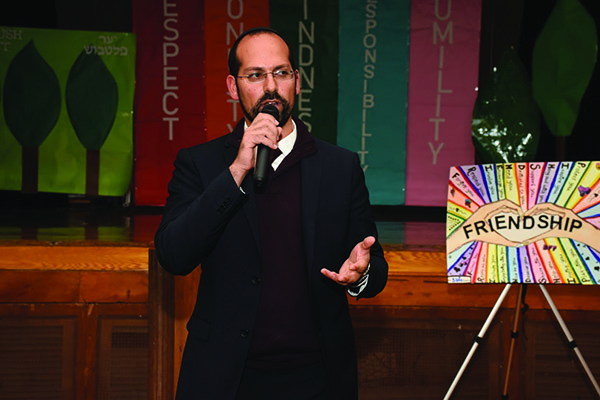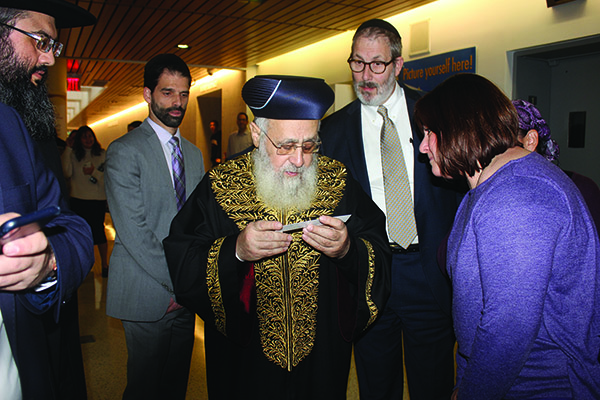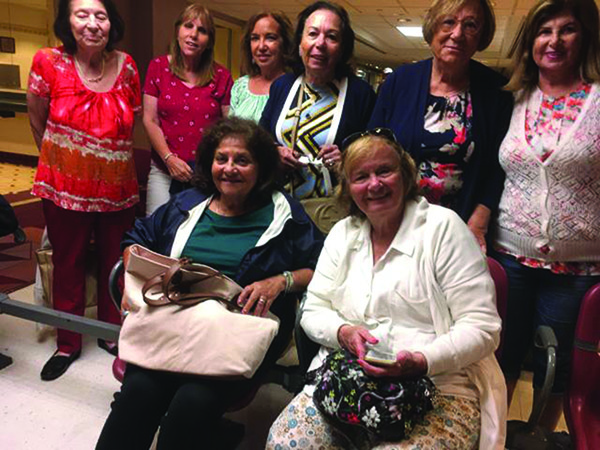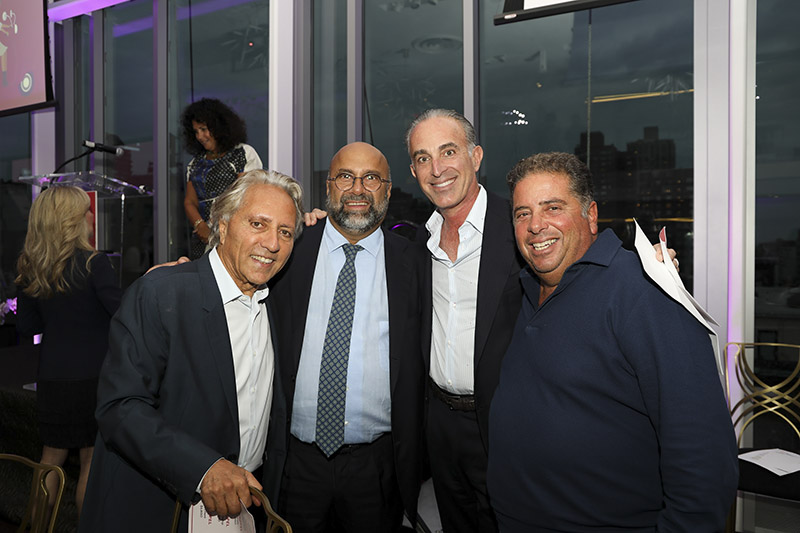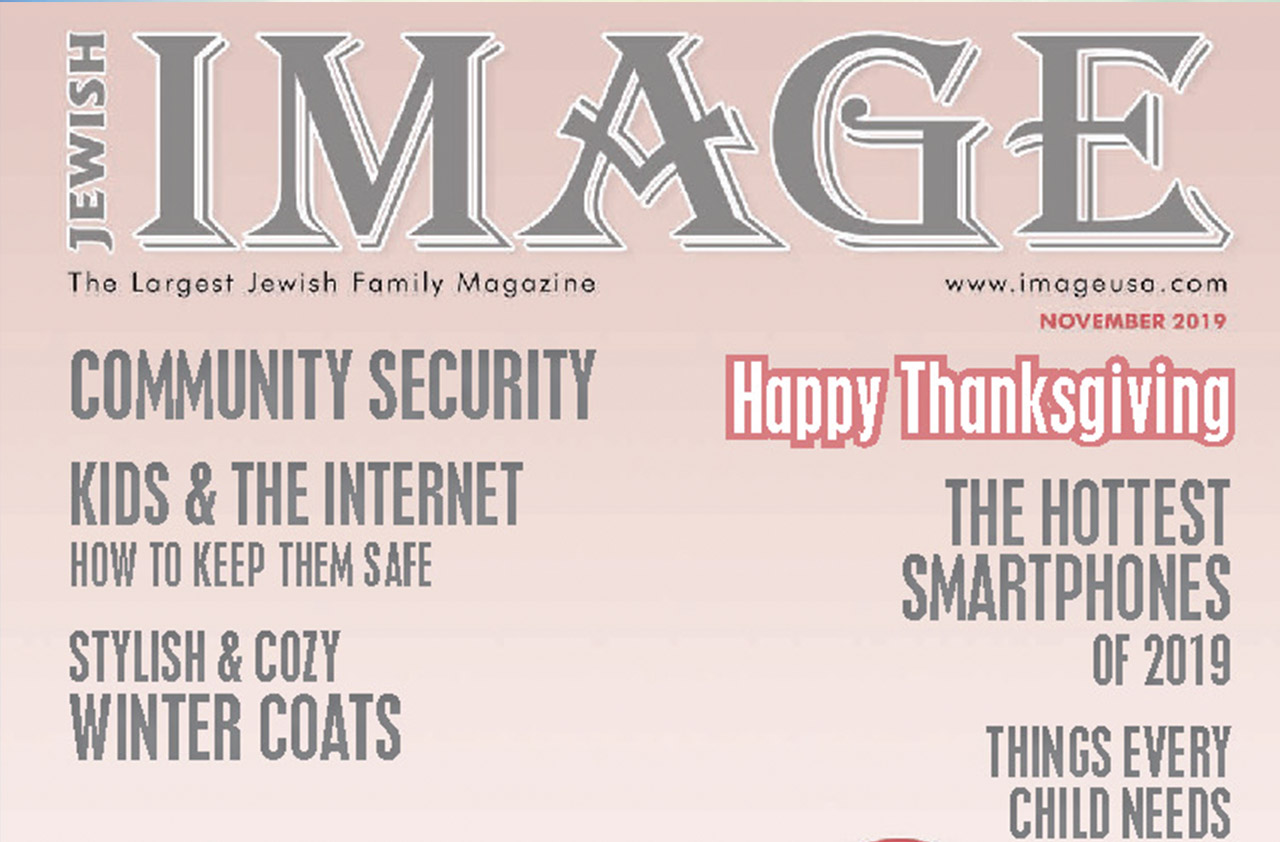Bayit V’Tikvah. Saving Girls In Israel
Bayit V’Tikvah is a girls’ home which cares for children who have been removed from their homes by social welfare services due to serious abuse and neglect. Many of our girls come to our home already lagging behind in their educational and social development, in poor physical and mental health.
The devoted staff, led by our managing director Rabbi Mendy Schwartz, our educational director, our professional psychiatrists, psychologists, our social workers and therapists give their all to provide our girls with the necessary support not just to get by, but to truly succeed.
We are functioning on a shoe string budget. Yet, we will never turn a girl away. However, as the girls turn 18, they “tap out” of the system and are required to fend for themselves. Without the required skills to get jobs or the resources necessary to “make it,” our girls won’t be able to stay off the streets. If not properly nurtured our girls run the risk of becoming perpetrators of the same crimes of which they fell victims (i.e. physical, sexual and drug abuse).
All too often, Israeli girls leave their homes and are unprepared for the reality of the outside world. Some sell their bodies to make money; others are forced to become prisoners of Muslim men in their villages.
It is imperative that while the girls are in our loving and warm environment, we prepare them for college and help them develop job skills to ensure they can survive on their own. Currently, we have two of our graduates attending medical school, while others are in nursing school, in the field of social work and education. With your support, we can provide programs that will enable them to leave our home with the power to not just survive but to thrive.
Rabbi Brian Thau, the Executive Vice President of Bayit V’Tikvah/House of Hope, will be vising the Sephardic community December 20-22 to raise money for their new building, for the girls Hankukah celebrations, and other programs not covered by child welfare services.
Bayit V’Tikvah/American Friends of House of Hope Inc. is a 501(c)(3) charity. Please help us help these girls. For more information please visit our website: bayitvtikvah.org or facebook: Bayit Vtikvah House of Hope.
Please send donations to American Friends of House of Hope 176-25 Union Turnpike, Suite 336, Fresh Meadows, NY 11366 or call our office at 929-900-HOPE (4673). You can also donate online at bayitvtikvah.org.

SAFE’s Day of Special Programs. Welcoming Senators Andrew Gounardes and Peter Harckham
The SAFE Foundation recently hosted a day of special programs and visits from New York State Senator Andrew Gounardes and NYS Senator Peter Harckham for community middle schools and for our honored guests to immerse themselves in our vital work treating and preventing addiction and teaching important social and emotional skills.
The day began in Magen David Yeshivah, where Dr. Norman Blumenthal discussed essential Internet safety topics. The presentation shared how children can protect themselves against online risks, keep their personal information private, and prevent online bullying. He provided the students with several “fire alarm” tools, or red flags that should be noticed and reported if something online feels suspicious. Dr. Blumenthal also reminded the children that they should always act in a considerate manner, especially because whatever goes online remains permanent. He encouraged the students to trust their guts and use their lessons from Project SAFE to make healthy decisions in the online world.
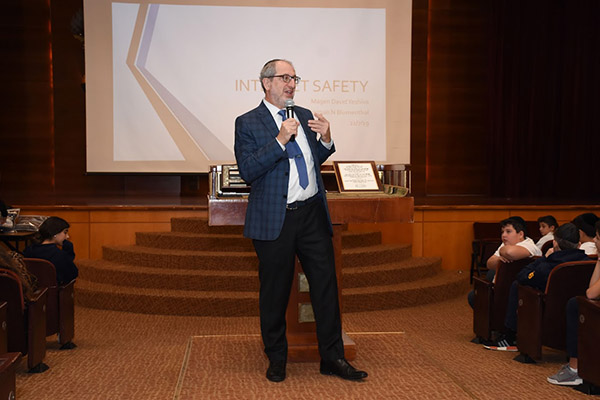
The second stop of the day was the SAFE clinic where Senator Andrew Gounardes and Senator Peter Harckham were met by Ike Dweck (SAFE CEO & Founder), Charlie Tebele (SAFE Board Chair), and Sam Sutton of the Sephardic Community Federation. Senator Gounardes is a friend and champion to the community. He secured $100,000 in general operating dollars for SAFE and crucial STEM funding for community schools! Senator Harckham represents is the Chair of the NYS Senate Committee on Alcoholism and Substance Abuse. We are thankful for the continued support of our Senators and for their interest in our efforts.
The Senators toured our clinic where they saw the invaluable work that SAFE does. They learned about our highly personalized client treatment plans, which help those struggling, and their loved ones, achieve lives of recovery and wellbeing.
After the clinic tour the Senators, their staff members, and Ike Dweck, Charlie Tebele, and Sam Sutton shared an intimate lunch hosted by Lorayne and Gabriel Shehebar at their home. Other guests included Michelle Haddad (board member), Corie Adjmi (board member), and Cynthia Kassin (Director of Community Education for SAFE). Lorayne Shehebar (board member) planned a beautiful lunch with delicious food catered by Eats by Marjorie & Lauren.
There the Senators were updated on the groundbreaking initiatives undertaken to broaden the scope of services and education for the community. Lorayne discussed her role co-leading, with SAFE Event Planner Ruthie Terzi, Stoop Talks where community members tell their stories about addiction and how the number of confidential calls to the clinic rise after each event inspires those who need help to ask for it. Lorayne also leads the mentoring program in our High Schools where parent volunteers come in to talk to the students about what life really looks like after graduation.

Corie Adjmi discussed the work of the Parenting Education Volunteer Committee that she chairs to raise awareness of parenting techniques that build self-esteem and confidence in children from a young age. She explained how it is crucial to teach healthy parenting behaviors and approaches, since research has shown that a positive approach to parenting can help our children avoid risky and addictive behavior later in life.
After lunch it was on to the last activity of the day at the Yeshivah of Flatbush Elementary School, where the middle school was holding a reception for the winners of the Project SAFE Poster Contest! The 6th, 7th and 8th graders had created posters that depicted what they learned in their SAFE class. Themes ranged from friendships, anti-bullying and healthy eating habits to vaping, substances and alcohol. Winners and their parents were at the reception where all the posters were on display.
Senators Gounardes and Harckham spoke to the children about the meaning behind their posters and the students responded enthusiastically. Students and parents were very excited, some even took selfies with the Senators. When the time came for the award presentation, Rabbi David Hertzberg opened with welcoming remarks. Ruth Waide of the YoF guidance team warmed up the crowd and thanked all for such a special day, and then Charlie Tebele introduced the Senators and explained how integral their work has been in aiding our community, our schools, and the State of Israel.
Senator Gounardes then took the podium and talked about the Flatbush Five (respect, honesty, kindness, responsibility and humility) and the importance of doing acts of service for others, including his “Three for the Community” initiative where he encourages neighbors to take three actions (big or small) each week to improve their community. He called on all students to take part and help contribute to over a million acts of service each year. Next, Senator Harckham spoke about how meaningful the day had been and encouraged students to value the friendships they are making now because these relationships will carry them through the rest of their lives.
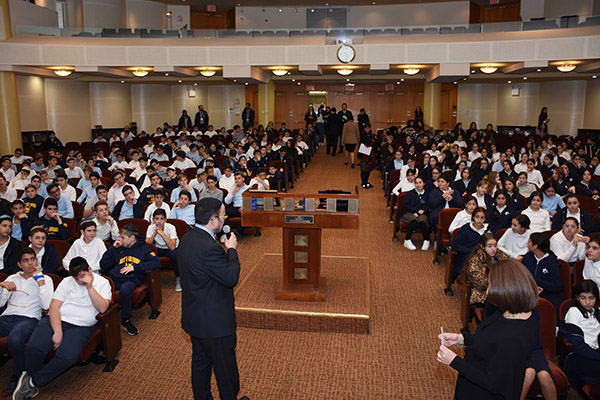
The Senators announced that Jacob Nussbaum was the winner of the boys contest. Jacob excitedly went up to receive his award, a grand prize of Airpods, and to have his picture taken with the Senators. Next, the winners from the girls contest, Fortune Zeitoune, Kelly Fatiha and Rebecca Spira were called up one by one to receive their awards, prizes, and a picture.
Rabbi Yahel Tsaidi, Head of School, then closed the assembly with a thank you to the SAFE teachers and guidance team at the YoF who worked very hard to bring the event together. After the award presentations, Senators Harckham and Gounardes joined Project SAFE teachers and the guidance team to discuss challenges that today’s youth face. They discussed the importance of teaching about the realities of vaping, the importance of healthy body image and healthy eating, as well as emotional awareness and recognition. The Senators, the SAFE team, the board, school leaders and teachers could not have been prouder of the amazing work of SAFE and the meaningful partnership Project SAFE has with our community schools.
If you or a loved one need help call us confidentially at (718) GET-SAFE.
The Center Presents Joseph Shamie with The First-Ever Community Humanitarian Award
On a mild Tuesday night in August, amid bright pink roses, matching tablecloths and white umbrellas brightly contrasting a dark sky, over one thousand people excitedly gathered at Ester and Joseph Jerome’s home in Deal, NJ to honor Joey Shamie with the first-ever Sephardic Community Center Humanitarian of the Year Award.
Off to the side, rippling slightly with the breeze, stood a white fabric wall decorated with the logos of multiple organizations to which Joey has contributed over the years. AIPAC, The Sephardic Community Federation, Delivering Good, Teach NYS, Sephardic Bikur Holim, Operation Homefront, and The Center joined together on August 20th as never before.
After enjoying dinner around a pool shimmering with their colorful reflections, guests focused their attention on the huge screen to watch a short film titled Where’s Joey? The film highlighted the almost superhero qualities of one man making a tremendous difference in our world.
In Where’s Joey? a quick-footed cameraman along with the voice of Alice Adjmi travels in search of Joey Shamie. In one day, this pair keeps missing him, as they check various locations and ask a multitude of people where he could be. From his house in Loch Arbor to his shul down the block to Times Square and the UN in Manhattan to Fort Dix in New Jersey and then all the way to China and back to The Center in Brooklyn—the exasperated crew cannot catch up with Joey’s pace! To help solve the mystery, they approach family members, exercise buddies, rabbis, pals, work staff, business associates, politicians, the chief of the NYPD, and the oh-so-many people Joey works with on oh-so-many charitable organizations. In the end, he is found at this very event, enmeshed within the excited and applauding crowd.
From the podium, Joseph Jerome welcomed all and stated, “No one deserves the night’s accolades more than Joey Shamie.”
Ricky Novick, one of the chair people added, “Joey is a man of action for those rich or poor, civilian or military, old or young, Jewish or non-Jewish. He is truly dedicated to Tikun Olam—to bettering the ‘community of man.’” Ricky then informed the crowd that Joey selflessly donates his time and money to over two dozen not-for-profit organizations.
Ricky’s co-chair Gladys Haddad beamed with admiration as she compared Joey to Abraham Avinu, who was a kind and honest visionary and pioneer dedicated to sharing his treasure with all humanity.
Lisa Baum of IDB Bank contributed to this mountain of praise by saying, “Joey is the warmest, kindest, most gentle and soft-spoken person you can ever meet. He is universally beloved in business and in life.”
Joey is the co-owner of Delta Cribs with his wonderful brother Sammy. In this professional sphere too, together, they display tremendous care. With the comfort and confidence that comes from having a solid and supportive partner, Joey often flies from California to Vegas to Harlem to military bases to personally donate and distribute cribs, strollers, and other products to those in need.
Just when everyone was wondering how Joey achieves as much as he does, his son Louis shared a cleverly composed list instructing the audience how to live like his dad. He said, “Root for the underdog, be persistent, smile, socialize, learn from everyone, and focus on others!”
Throughout the proceedings, organizers of the program showered Joey with awards, plaques, and Judaica. When Gladys Haddad presented Joey with a menorah, she stated, “Just as the hanukkiah brings hope and light to the world, so too do you bring hope and light to all of us.”
Said Talia Toussie, one of the main chairs of the event, “This program unified our community in such a special way. By celebrating the work of one special person, we inspired so many people to do hesed in any form and to realize that there are opportunities everywhere. We are all lucky to have Joey as our friend and mentor. Everybody in attendance had a personal connection with him and considers him their own special friend. It was amazing!”
Testifying to the truth of her words are the hundreds of joyous photographs taken of Joey with leaders of the community; committee after committee; almost every guest in attendance, his extended family, and with his dear wife Adrienne and their children.
In his closing speech, with a tear glistening in each eye, Joey thanked the organizers of the tribute; the attendees, Adrienne and his entire family, plus his parents and mentors—who influenced him so positively. He then strongly encouraged each person to get involved in some way. He urged, “Get out there and do. You can do it!” Spreading his arms wide open, he exclaimed, “Just look at me. Any average Joe who puts their heart into it will succeed!”
Twenty three year-old Charles Chakkalo, who made Joey’s acquaintance this year, took these words to heart and wanted to hear more. He spent much time speaking with Joey this summer about community matters, politics, and business, and wanted to give his peers an opportunity to experience Joey’s passion and wisdom as well. And so, he, with Jojo Tawil, Elliot Dweck, and other volunteers, organized Mazza and Conversation with Joey Shamie, moderated by Ezra Ashkenazie for young adults by Ezra and Sharyn Ashkenazie’s beach. Charles helped plan the gathering in just 48 hours, and was pleased at the easy turnout of 150 people!
In a true chain reaction, Charles’ friend, Samantha Chabot, along with those same volunteers, followed his lead and created the next young adult event focusing on hesed and involvement. This took place at the end of October at The Center and featured a Q&A with Joey Shamie and two of his role models: Nancy and Sam Sutton, a true dynamic duo.
Grace Sutton, The Center’s Volunteer Coordinator is currently working on other like initiatives. It seems there are many from all age groups who continue to be motivated by one very magical night and one very special man.
Contact grace@scclive.org to get involved. Organizers of the event included Gladys Haddad, Joseph Jerome, Ricky Novick, Steven Hidary, Talia Toussie, Joey Tawil, Sari Setton, Adrienne Shamie, Loraine Gold, Jack Anzarouth, Norma Cohen, Renee Braha, and Rochelle Dweck.
Chief Sephardic Rabbi of Israel Hagaon Hacham Yitzhak Yosef
The Sephardic community was deeply honored by the recent visit of Israel’s Sephardic Chief Rabbi Yitzhak Yosef. He came to Brooklyn and New Jersey, spoke to students at Magen David Yeshivah, the Yeshivah of Flatbush, Hillel Yeshiva, and others. In New Jersey, community members gathered at Congregation Magen David of West Deal to hear him speak and he met with seniors at DSN. His words of wisdom and the blessings he bestowed on our community, wherever he visited, were cherished.
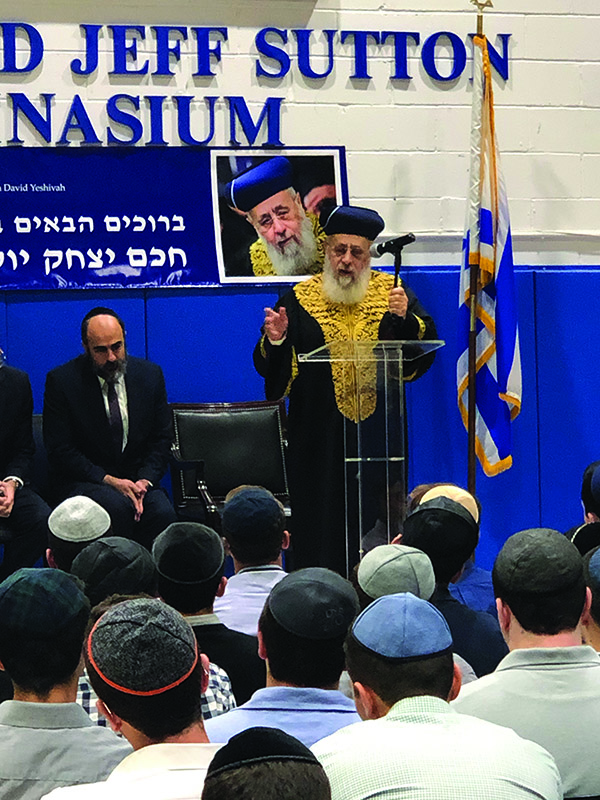
It had been three years since his last visit to DSN. Executive Director Sammy Sitt greeted him outside the building and led him into a room where 40 seniors were awaiting his visit. He was introduced by Rabbi Saul Kassin, who told the Chief Rabbi, “I want you to meet these seniors, because they are the people who built the Sephardic community in America.” The Chief Rabbi proceeded to speak words of Torah, and finished with a blessing. It was a great day.
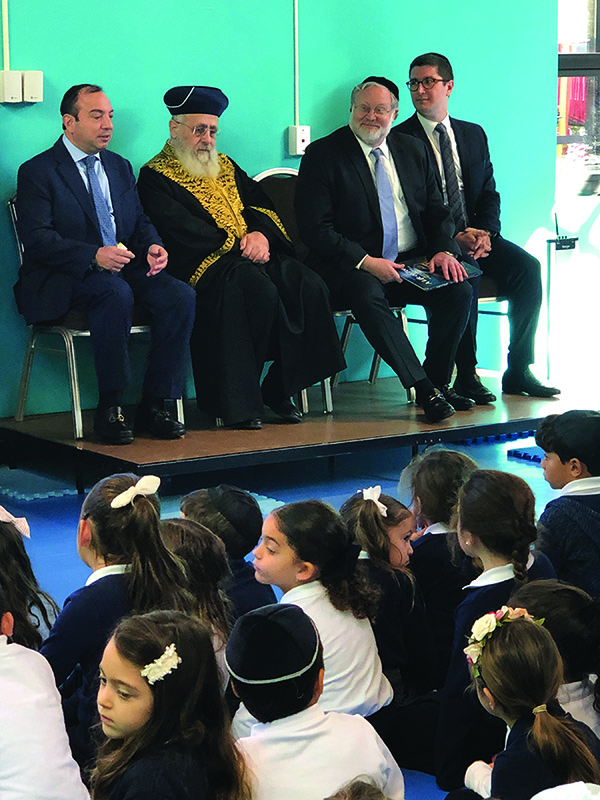
Students and teachers at Magen David Yeshivah and The Yeshivah of Flatbush were honored to host the Rishon Lesiyon, Chief Rabbi of Israel. At Magen David, the children sat in awe as he spoke about the challenges that face them in the world today, and related that to what Abraham went through in the week’s parashah. At Yeshivah of Flatbush, students sang songs and pizmonim, then Chief Rabbi Yosef spoke and blessed them. It was a memorable morning for everyone. His words will resonate with all the children for years to come.
Hanukkah − The Festival of Lights Begins. The Evening of December 22 and Ends on The 30th
Hanukkah
Hanukkah, the Festival of Lights, is a celebration of a great miracle—the victory of a small, beleaguered nation over her powerful oppressors. In lighting the menorah, we rejoice in the triumph of freedom over tyranny, goodness over evil, right over might, and light over darkness. Each year as we celebrate this holiday and kindle our menorahs, we add more light to the world.
Redemption, Against All Odds
In the time of King Antiochus, the fate of the Jewish people seemed grim, indeed. The vastly outnumbered Maccabees were up against the world’s most sophisticated military machine. They faced opposition from within, as well. Many of their brethren were meek, complacent, and all too willing to forsake their heritage and assimilate into the Hellenistic culture. It was the proverbial “darkest hour before the dawn.” Yet, sure enough, with the dawn came the miraculous, unprecedented victory. With G-d’s help and against all odds, the Maccabees were able to reclaim the Holy Land and rededicate the Holy Temple.
Throughout the ages, Hanukkah has signified the miraculous triumph of the weak over the strong, the pure over the impure and the righteous over the wicked. Whenever the integrity of the Jewish people is under siege, no matter how dark the night, the Hanukkah lights proclaim with confidence that the dawn of deliverance is near.
Spreading the Light
The menorah is lit either in the doorway, or in a front window, so that it can be seen outside in the street. It is not enough to bring light into our own homes, we must spread the light and warmth of Torah to the outer environment as well, as far as our influence can reach.
Light the Menorah with the whole family! Use olive oil or candles large enough to burn until half an hour after nightfall.
Brighter and Brighter
Each night of Hanukkah, we add another light to the menorah, until all eight lamps shine on the eighth night. This signifies that in matters of holiness, we must always increase. With every added flame, we deepen our commitment to the values and traditions of our Jewish way of life.

Illuminating the Darkness
A great rabbi once remarked that “you cannot chase away darkness with a stick—you have to turn on the light.” The way to eliminate darkness—to rid the world of ignorance, negativity, hatred and greed—is to kindle the lights of knowledge, generosity, hope, and love.
Hanukkah reminds us that even in our darkest moments, the light of knowledge can shine brightly, and that redemption is at hand—if we will kindle just one more lamp.
Fun Customs
Hanukkah gelt for the kids! Reward your children and grandchildren with Hanukkah gelt for exemplary behavior such as diligence in their studies and acts of charity. Of course, this beautiful custom adds to the children’s happiness and festive spirit. Whether it’s money or chocolate it will put a smile on their little faces.
Play Dreidel! The dreidel is a four-sided spinning top, also called a s’vivon, in Hebrew. On each side is a Hebrew letter: Nun, Gimmel, Hay, and Shin. The letters stand for the phrase Nes Gadol Hayah Sham—a great miracle happened there. It is traditionally used to play a lively game.
Eat donuts and latkes and other foods fried in oil, to remember the miracle of the oil lasting for eight days!
Wishing you a Happy Hanukkah. May this Festival of Lights bring blessings upon you and all your loved ones for happiness and for health, peace and security in Israel, and usher in a better world for all of human kind.
Read Jewish Image Magazine Online – December 2019
Read Jewish Image Magazine Online – December 2019
Click Here
To View Jewish Image Magazine in PDF
Click here
2019 ORT Bus Trips To Atlantic City
This past summer we took three one-day bus trips from Deal to Atlantic City. Each trip was to a different hotel— Resorts, Caesar’s and Tropicana—and all three days were terrific! On the bus, we raffled off prizes, told jokes, played Arabic music, and relaxed. In Atlantic City, we walked the beautiful boardwalk, saw an amazing military air show, and musical show, ate lunch, shopped and of course gambled. Everyone had a wonderful time.
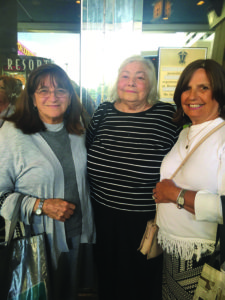
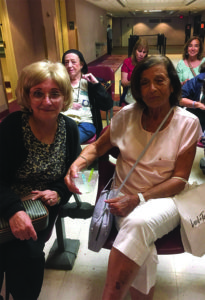
ORT stands for Organization for Rehabilitation through Training. It is a network of vocational schools, which focus on teaching skills that are in demand in today’s world. There are ORT schools in Israel, New York and many other countries. ORT programs are guided by the spirit of tikkun olam (repairing the world and making it a better place). They believe in the saying, “If you give a man a fish, he eats for a day. If you teach him to fish, he eats for a lifetime.”
Many thanks to Joyce Dwek, for coordinating the fun fundraising trips. We couldn’t have had this experience without all of Joyce’s hard work, with the assistance of Sally Shamah, Louise Zalayet and bus helpers Norma Rezak, Joy Assoulin, and Frieda Lubin. The President of our chapter is Mrs. Freida Kassin. The ORT chapter was brought to our community by Estelle Marcus. We look forward to more great trips next summer.
DSN’s Summer Baseball League
Baseball season may be over for this year, but the memories and friendships that DSN fostered in its Baseball League over this past sum-mer are everlasting.
Over 300 children, ranging in age from kindergarten to 5th grade, par-ticipated in a weekly Sunday baseball league. It was the largest participation rate to date, multiplying almost six times from the opening season in 2013!
Volunteer parent coach-es instructed the 32 teams each Sunday, spanning eight fields and attracting up to 1,000 spectators weekly. They taught the kids the rules and strategy of the game, with an emphasis on sportsmanship, camaraderie and team spirit.
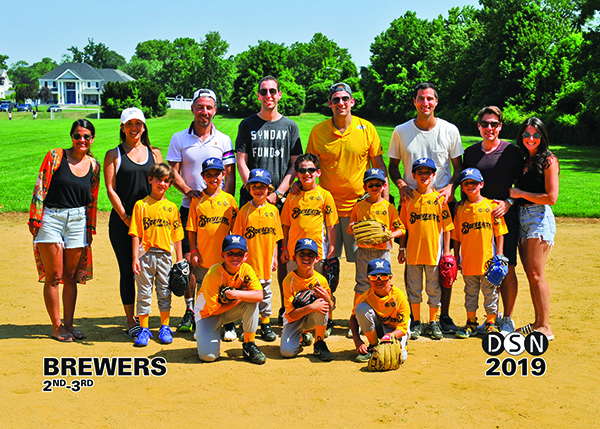
Sol Chehebar, a DSN summer head coach, remarked, “DSN has transformed sports in the commu-nity and I am very grateful for the opportunity to coach my sons in the summer league. There is no better feeling than watching kids ages 5-10 learn, excel, and enjoy the game through the lens of a parent. It has become a highlight of the summer for the kids, parents and grandpar-ents! Thank you DSN, for your care and attention to the details. That’s what makes the league the greatest possible experience!
”The end of the season culmi-nates with an incredible trophy cer-emony, where the coaches give out awards, and the audience gets to enjoy a highlight reel from the season.

Jon Entel, DSN’s Director of Sports Leagues, can’t get over what a successful season it was. “This league is truly amazing. It’s an incredible community feeling with parent coaches teaching their chil-dren the game of baseball, amongst many life lessons during the season. May the DSN league be blessed to have many more years of growth and success!”
Living with Tourette Syndrome

Imagine standing in line at a supermarket, at the next register you see a mom with a child of about nine years old. While unloading your groceries on the belt, you hear the child start to swear using a socially unacceptable word over and over again. You get uncomfortable and stare at the mom who is just standing there and continuing to empty her cart as if nothing is happening. She doesn’t stop him or reprimand him. You are probably thinking what kind of mother doesn’t stop and reprimand the child for speaking like that? What kind of mother allows her child to talk like that?
The answer: A mother with a child who has Tourette Syndrome (Tourette’s)—and she’s so embarrassed she wants the floor to swallow her. When you see children with special needs, your heart melts and if they walk funny, drool, or do anything that would normally be socially unacceptable, it’s acceptable, because it is justified by their special needs. A child/teen with Tourette Syndrome (which is one type of tic disorder) looks and acts normal until they have a tic. So, the parents and child are judged and embarrassed unless the people around them are educated and understand that he suffers from Tourette Syndrome.
Tourette Syndrome is a problem with the nervous system that causes the individual to make movements or sounds called tics, that they can’t control. It often starts in childhood and is usually more common in boys than girls. For most children, symptoms tend to improve by the end of adolescence with a small number becoming symptom free. The main symptom is tics, some are so mild they are not even noticeable, others happen often and are obvious. Stress, excitement, being sick, or tired can make them worse. There are two types of tics, motor tics involve movement, which include, but are not limited to eye blinking, facial grimacing, mouth twitching, head bobbing/jerking, shoulder shrugging, neck stretching, and arm jerking. Complex motor tics involve multiple muscle groups or combinations of movements and tend to be slower and more purposeful in appearance, for example hopping, twirling, and jumping. Vocal/phonics tics produce a sound. They include, but are not limited to sniffing, throat clearing, grunting, hooting, shouting, barking, yelping, coughing, repeating what someone else says, swearing. Complex vocal tics are words or phrases that may or may not be recognizable but that consistently occur out of context. In some cases, the words may be inappropriate, such as swear words, ethnic slurs, or other socially unacceptable words or phrases.
Before a tic occurs, (it has been explained that) the individual gets a sensation that can feel like a tingle or tension. The movement makes the sensation go away. They might be able to hold the tic back for a little while but can’t stop them from happening. Doctors aren’t sure why, but about half of people with Tourette’s also have symptoms of ADHD. (Attention Deficit Hyperactivity Disorder) and may have trouble paying attention, sitting still, and finishing tasks. They may have trouble focusing and paying attention because they are thinking about their tics and worrying about who may be noticing them. Sometimes anxiety, learning disabilities, such as dyslexia and OCD (Obsessive Compulsive Disorder, like washing hands repeatedly) are effects of Tourette’s, as well.
Children/teens experiencing Tourette’s may be frightened or embarrassed by the disruptive nature of their tics at school, in the community, and with extended family. When Tourette’s is not understood by teachers, peers, family or people in the community, the child/teen with Tourette’s may feel rejected or ridiculed, and the impact it could have is devastating.
The teacher or family member needs to prepare the classmates, peers, and other family members with appropriate information about this condition, so they will feel comfortable with the child. This can prevent bullying and rejection before it starts.

People who are not familiar with the condition may believe that the individual is deliberately trying to attract attention or be disruptive. Fortunately, there is a lot that everyone around the individual can do to ensure that he/she can succeed in school or in life in general and have a healthy social life.
Get a thorough evaluation of your child. It will provide information about exactly how Tourette Syndrome (and any other conditions your child may have), will impact his/her life. You will get a report with specifics that you can share with the school, to help the teachers and everyone else that is in contact with your child, understand his/her needs. You must take a personalized approach, because each individual is unique; Tourette’s does not affect everyone the same way. Different strategies work for different people. Use the results of the evaluation, along with your knowledge of your child, to develop a plan that could work for him/her.
While the tics associated with Tourette’s are involuntary, a few treatment options do exist. In some cases, vocal tics can be lessened with medication. Getting proper treatment for other conditions your child may have such as ADHD, OCD, or even depression can help reduce tics. Be sure to discuss any medications prescribed for these conditions with your child’s doctor, as some may increase tics.
There are also behavioral-based approaches that may help reduce tics. Behavioral approaches may look for situations that trigger or increase tics, so that the child/teen can find new ways to cope with or avoid the triggers. Discipline and punishment will not work. The individual cannot stop a tic once the sensation begins. Tics are often described as an action that must be completed, like a sneeze. While some may be able to delay a tic for a short while, they cannot stop it, and unfortunately stress will increase tics in some people. Punishing someone for having a tic may lead to an increase in tics.
Encourage participation in extracurricular activities. Sports can provide more physical activity, which has shown to help decrease tics in some children and teens. It can also provide more opportunities to create friendships and work on social skills, which can be challenging for children/teens with Tourette’s.
Often the hardest part of living with Tourette Syndrome or living with someone diagnosed with it, is dealing with the embarrassment or frustration of having tics that can’t be controlled, and fitting in socially can be very hard for the child/teen. So, if you happen to be somewhere and notice a child with a tic, don’t stare or comment! Either look away as if you didn’t notice anything, or try and comfort the parent with encouraging words.
Kids & The Internet How To Keep Them Safe & Manage Their Online Lives
Young people are spending more time online than ever before, and this trend will not be reversing. A recent survey states that 95% of teenagers report owning a smartphone (or at least having access to one), and that 45% of teenagers are online, on a near-constant basis. Adolescents have limitless options when online, making it important for parents to teach them how to be savvy about their online presence.
SAFE knows firsthand about the need to educate students on the importance of Internet safety and the appropriate use of cell phones, social media platforms, and other online trends. Project SAFE’s classroom curriculum currently includes topics and lesson plans focused on staying safe online. Students in our classrooms are leaning lessons, and tackling tough questions, such as:
Q: How much and when is it appropriate to share personal information online?
Q: Do colleges and employers really Google you before they make a decision?
Q: What length of screen time is too much?
Q: How do you manage friend requests and online communication with potential strangers?

These types of questions and concerns continue to evolve, as technology trends and platforms become omnipresent in our children’s live. Project SAFE works to stay up-to-date on these trends and provide current, clear, and relatable information for our students. These lessons work best when they are reaffirmed at home, therefore, SAFE encourages parents to discuss these important Internet realities and safety tips with their children:
- Not everyone is who they say they are online. And sometimes the people you know in real life don’t behave the same way online, so it is best to remain in control of your personal information by not distributing it. When people want to get to know you using false identities online, it is often called a sockpuppet profile, or catfishing. Both center on hiding the person’s real identity in order to bully or lure others into inappropriate texting, emotional and financial scams, or to find out personal information.
- Financial information should never be shared online with others. When online, as a general rule, individuals should only purchase products from reputable and verified companies, and financial information should never be distributed via social media, messaging platforms, or other one-on-one forms of communication. Friends don’t ask online for your credit card information; they’ll call you if they really need it. If you find yourself questioning if a company or online interaction is a scam—it probably is—and communication should stop immediately.
- Online is permanent. Yes, there are companies that specialize in Internet scrubbing or disrupting search engine results, but they cost thousands of dollars and aren’t always effective. Even if an app claims to be secure, someone can still take a screenshot of it. Then they can show it to someone else. There is no real assurance that others will not see it (and potentially store it). A rule of thumb for social media platforms: if you are not comfortable with a post or remaining online indefinitely, you should not put it up at all.
- Discuss privacy options and parental control. The majority of social media platforms offer several forms of privacy and profile access. All parents should sit with their children and review the level of access their children’s profiles permit—is it just for friends, or is it for friends of friends, and other individuals? Together, you and your children can find permission levels that you are comfortable with and you can help them understand why it is important to have a higher level of control over their information and pictures.
- Limit screen time. Setting screen time limits is a challenging, yet important aspect of Internet safety (especially with young children). There is a wide range of thought available regarding the appropriate amount of time pre-teens and young adults should spend online, and it is a decision that should be made on an individual basis, based on factors like age, interests, performance in school, social activities, etc. With that being said, maintaining a time limit and sense of boundary helps reinforce the idea that technology, while a wonderful privilege and increasing necessity in everyday life, must be handled with the proper degree of restraint, caution and wisdom.
SAFE believes that an open, honest and transparent dialogue remains key in establishing appropriate measures of Internet and technological safety in one’s household. While it is important to address these very real concerns with your children, it is also important to acknowledge the benefits, joys, and privileges of using the Internet. In emphasizing both the pros and cons of technology, parents are more likely to come across as genuine and authentic in their concerns for their children.

One important recommendation is for parents and caregivers to familiarize themselves with the platforms their children are using, as this will help increase their overall knowledge of the risks and rewards their children are facing.
Allow your children to share their motivations and wishes for Internet and social media usage, and make the conversation an open and transparent dialogue.
It is important to have these conversations, because children will inevitably learn how to like, comment, and swipe up—somewhere—it’s better they learn from their parents and trusted adults.
Magen David Yeshivah High School Remembers Eli Chalouh A”H
The terrorist strikes perpetrated on September 11, 2001 impacted all New Yorkers. They were particularly painful for Brooklyn’s Jewish Syrian community, because that morning, Eli Chalouh A”H, a young Syrian Jew, woke up, went to work, and never returned. He was working at the NYS Department of Taxation and Finance, in the World Trade Center—he was only 23 years old. Eli left behind his parents, siblings, and a legacy of kindness, dedication, and perseverance.
Eli graduated from Magen David Yeshivah High School in 1996. Associate Principal Esther Tokater, along with a number of Eli’s classmates, many of whom are parents of current MDY students, organized a hesed event in his honor, on the 18th anniversary of the attacks.
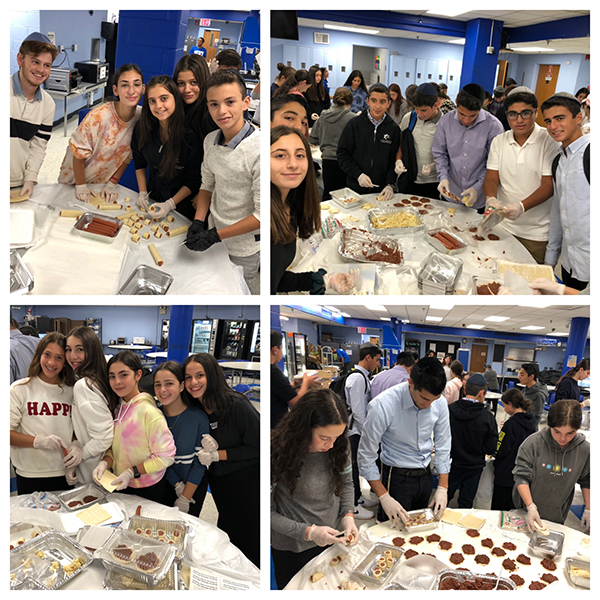
The class of 96 invited representatives from many community organizations that are near and dear to their hearts. They, and current MDY students, committed to fulfilling Eli’s legacy of kindness by doing hesed projects for the organizations, in his name.
Alumnus Albert Nigri, father of freshman Rosie Nigri, kicked off the event with an emotional speech in which he shared high school memories of Eli. He said Eli treated others with kindness and was always willing to help his classmates. Albert recalled Eli’s arrival from Syria, at the age of 14, and the language and cultural barriers he overcame to succeed in the United States. Eli seemed to be living the American dream, until his life was tragically cut short.
After Mr. Nigri’s speech, the audience was inspired to participate in hesed activities. Raquel Haber, mother of MDY senior Gabriel Haber, Jamie Waingort, (my mother) and mother of freshman Emily, and Marcy Franco, mother of senior Morris Franco organized a group to cook for the SBH Food Pantry. The crew prepared and packaged mazza, which was delivered to Sephardic Bikur Holim, that evening.
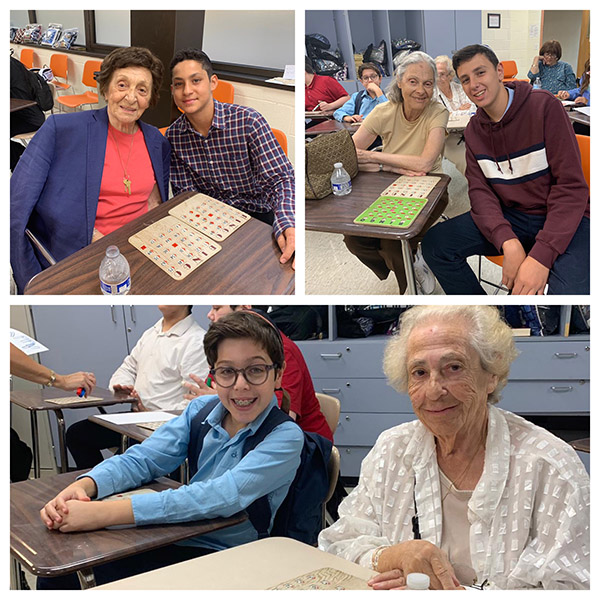
Albert Salama, father of freshman Ninette and junior Jacques, introduced students to Bonei Olam, an organization that helps couples achieve their dream of parenthood. Students were so moved by the work that the organization does, they committed to do mitzvot in honor of families faced with fertility challenges. They wrote notes to the families, describing the commitment they were taking on in their honor, and telling them that they’re praying for them to achieve their dreams.
Albert Nigri and Alan Nasar, father of sophomore Sarah, and senior Joel, helped students put together care packages to be distributed to Hatzalah volunteers. The packages included snacks and letters of encouragement and appreciation for our heroic, first responders.
Morris Cattan, father of junior Diane Cattan, helped students design sweatshirts for the orphans of Bet Elazraki, in Israel. Students drew original designs which Mr. Cattan will turn into actual sweatshirts, and personally deliver to the orphanage in Israel this spring.
Richie Chalme, father of sophomore Jamie and senior Robyn, demonstrated the important role music plays in healing, explaining that he uses music when he visits the elderly and the sick.

Sally Smouha, mother of junior Marc and freshman Abraham, and Sally Franco, mother of sophomore Allegra, invited a number of community seniors citizens to the event. They were delighted to go head-to-head with the students in a few intense rounds of Bingo.
In addition, MDY was honored to host members of the Chalouh family, including Eli’s sister Sarah, his aunt, and nephew. Eli’s nephew remarked that entering a school that he was not familiar with, seeing dozens of students he never encountered, doing hesed in memory of an uncle he never met, was a truly remarkable feeling. He was excited to meet his uncle’s classmates, who could share stories about him.
Walking around the building, and seeing classroom upon classroom filled with students doing hesed, was truly inspiring and certainly elevated the neshama (soul) of Eli Chalouh A”H.
Doing hesed is a beautiful way to honor someone you love and ensure his/her legacy will endure for years to come.
A Night To Remember
It was a night to remember for PROPEL, as the nonprofit organization celebrated its accomplishments on September 23rd at the Moise Safra Community Center (MSCC) in Manhattan.
Approximately 150 guests— including community leaders and PROPEL board members, professionals and clients—gathered in the beautiful ballroom of MSCC to honor the wonderful women who inspired the PROPEL funds and schools Joyce Silverman, an interior decorator extraordinaire; and Cookie Cohen, an inspiring young entrepreneur.

Harry Adjmi, our community’s well-known emcee at many charity events, opened the event with a warm welcome. Then a video montage portraying the accomplishments of PROPEL graduates and events during the past year was featured on large screens.
PROPEL invests in coaching and guiding women to be the best they can be, by finding suitable careers that generate income. PROPEL focuses on careers that make sense and honor the traditional values of our community. Women are heroines—they are balancing professional and family life successfully.
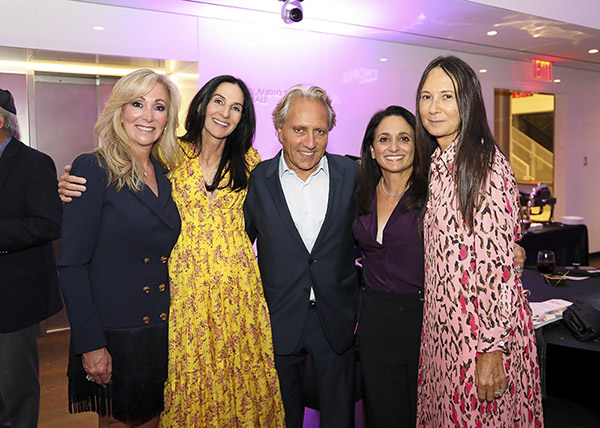
The evening was beautifully organized to recognize the co-founders of PROPEL Rebecca Harary, in tribute to her mother Joyce Salame (in conjunction with proud son-in-law Marshall Aronow) and Ezra Ashkenazi, in tribute to his wife Sharyn. Rebecca and Ezra described how PROPEL was formed and how the organization has grown over the last four years.
Joyce Salame and Sharyn Ashkenazi, who inspired the PROPEL Leadership and Empowerment Funds, respectively, were each presented with an artistic rendering of Petihat Parnassa, the prayer for Sustenance, we recite on the High Holidays. That’s what PROPEL does—it helps families by guiding women into the workforce to provide a much needed second income.
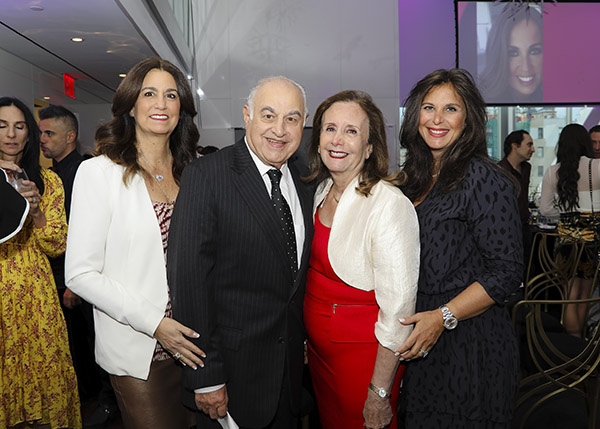
PROPEL proudly honored the women that inspired some of the PROPEL schools: Rachel Khafif presented an award to her mother Robin Braka (School of Art); Ivette Dabah presented an award to her daughter-in-law Barbara Dabah (School of Technology); Freda Haddad Sutton presented awards to her daughter-in-laws Sharon Haddad and Nellie Haddad (School of Wellness); and Jimmy Haber was presented an award in memory of his wife Amy Haber A”H (School of Education). Each honoree was presented a plaque which contained the prayer Eshet Hayil, recited every Friday night. The prayer extols the virtues of women and enumerates both the familial and professional roles that women embody.

Sarah Gindi, longtime friend of our honoree Joyce Silverman (The Illumination Awardee) spoke eloquently about Joyce’s talents as an interior designer, as well as her benevolence. Joyce created The Nest Fund, which donates gently used furniture to those less fortunate.
Cookie Cohen, a role model for her generation, told the story of CocoBox, a successful start-up business supplying recipes with creative ingredients to a growing clientele. Her sister-in-law Sonia Cohen exquisitely elaborated on Cookie’s tremendous accomplishments and presented Cookie with The Young Leadership Award.
Probably the moment of the evening which allowed the guests to understand the instrumental work of PROPEL was when graduate, Frieda Schweky passionately told her story from the podium. Frieda is now a photographer and supports her family for the moment, as her husband builds his business. She acknowledged that none of this could have been done without PROPEL believing and investing in her. We are very proud of Frieda!

PROPEL is very thankful for a dedicated Board of Directors led by Co-Presidents Haim Dabah and Jacqueline Harary and Vice Presidents Michael Haddad and Gayle Krost, a committed professional team, and, of course, the clients who make the organization proud every day.
PROPEL is extremely appreciative of all the community members who support this organization, and all the donations pledged at the event. The organization offers financial scholarships to its clients to cover part of the cost for certification courses and exemplifies “smart giving.”
By investing in women, each donation evolves into a salary which can help support a family, and ease the financial burden which is a reality in today’s world. As the Rambam proclaims, teaching a person a trade is one of the highest forms of tzedakah. PROPEL is committed to the financial success and future of the community by inspiring women to feel confident in careers of their choice.
PROPEL helps women discover their passion, profession and earning potential. PROPEL invests in family—one woman at a time!
If you are interested in a career, please reach out to PROPEL. We can help you fulfill your professional goal. Call 646-494-0822 or email info@thepropelnetwork.org.
Follow PROPEL on Instagram @PropelNetwork to find out information about upcoming programs and events.



